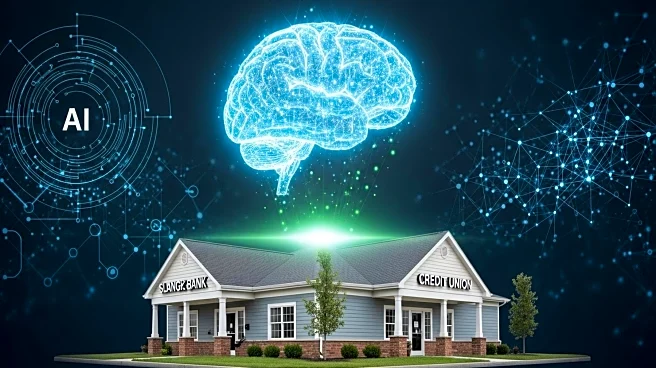What is the story about?
What's Happening?
Community banks and credit unions are increasingly adopting AI-driven credit decisioning as a strategic necessity to enhance their competitive edge in the financial services sector. This technology is revolutionizing traditional loan approval processes by significantly reducing the time required for credit decisions, which can now be made in minutes rather than days or weeks. AI platforms like Upstart have shown a 27% increase in loan approvals while maintaining default risk levels and offering lower interest rates. Additionally, AI-driven automation in areas such as fraud detection and compliance monitoring is leading to substantial operational cost savings. Digitally mature credit unions are experiencing up to double the annual revenue growth compared to their less tech-savvy counterparts, highlighting the financial benefits of AI adoption.
Why It's Important?
The integration of AI in credit decisioning is crucial for community banks and credit unions as they compete with larger banks and fintech companies. By leveraging AI, these smaller institutions can improve efficiency, reduce costs, and offer personalized financial services, thus expanding their customer base and aligning with financial inclusion goals. The technology also enables the use of non-traditional data points for credit scoring, allowing these institutions to better serve underbanked populations. As AI adoption continues to grow, it is expected to drive strategic differentiation and customer-centric innovation, making it a vital component for sustainable growth in the financial sector.
What's Next?
As AI adoption accelerates, community banks and credit unions are expected to increase their investment in AI technologies. A significant portion of credit union digital leaders plan to boost their AI budgets in the coming years, focusing on customer engagement and operational excellence. However, challenges such as potential biases in AI models and data quality issues remain, necessitating robust oversight frameworks to ensure fairness and compliance. The future success of these institutions will depend on their ability to integrate AI into their core operations while addressing ethical and regulatory concerns.
Beyond the Headlines
The rise of AI-driven credit decisioning also raises important ethical and regulatory considerations. The U.S. Government Accountability Office has highlighted potential biases in AI models as a critical challenge, emphasizing the need for institutions to prioritize fairness and compliance. As AI becomes a foundational pillar in the financial sector, stakeholders must navigate these complexities to ensure equitable access to financial services and maintain public trust.
















